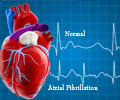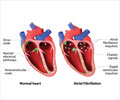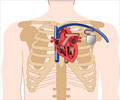Novel smartwatch app displays electrical activity of the heart and notifies patients with AFib if their heart rhythm is normal or indicative of AFib.
- A wearable wristwatch technology tracks the heart’s electrical activity and notifies patients with atrial fibrillation of their heart rate status.
- Placing a finger on the wristwatch tells the user if the heart rate is normal or indicative of atrial fibrillation.
- This technology may help screen patients prior to scheduling electrical cardio-version procedures and avoid scheduling ones that are unnecessary.
Atrial fibrillation and its management
Atrial fibrillation (AFib) is a type of heart rhythm disorder where the heart beats irregularly and often rapidly. During atrial fibrillation, the heart’s upper chambers beat chaotically and out of coordination with the lower chambers of the heart. This condition increases a patient’s risk for heart failure stroke and other heart-related complications. It affects about 9 percent of people over the age of 65 in the U.S alone. Patients with AFib either choose to opt for a pacemaker or an implanted defibrillator to normalize the heart rhythm. However, these methods can be expensive and are invasive. Most patients choose for a scheduled electrical cardio-version, a procedure which applies an electric shock to the heart to restore normal rhythm. The procedure is often done under some type of sedation or anesthesia.Why it is better than a heart rate monitor
- Records even a single lead electrocardiographic (ECG) tracing, allowing the user to visualize the heart’s electrical activity, including the rate and regularity of heartbeats.
- At any time, the patient can place a finger on a spot on the wristband and the smartwatch algorithm will instantaneously tell the reader about the heart rhythm; if it’s normal, indicative of AFib or undetermined. In case of undetermined readings, coupling it with physician’s review could reliably differentiate between AFib and normal heart rhythm.
- It is cost effective when compared to pacemakers and implantable defibrillators.
Study overview
"Our patients are exposed to a growing number of health care devices that are available for purchase without a prescription. What we don’t know is if these devices provide meaningful clinical information that patients and their physicians can interpret and use effectively," said Joseph Bumgarner, MD, an electrophysiology fellow at Cleveland Clinic and the lead author of the study. "Our study is the first to assess how accurately a wearable smartwatch device can identify AFib or normal sinus rhythm compared to a standard 12-lead ECG as is often done in the clinic."The study enrolled 100 patients aged 68 years on average with AFib who consecutively presented for a scheduled electrical cardio-version. People who had a pacemaker or implanted defibrillator were excluded from the study.
Each participant was given a smartwatch equipped with the wristband technology and coached on how to use it. The participants also underwent a standard ECG. The team then compared the automated smartwatch interpretations with the physician-reviewed standard ECG and cardiologists determined how accurate the wristwatch readings were.
Study findings
- When the algorithm was able to provide a diagnosis (normal heart rate or AFib), it detected AFib with 93 percent sensitivity and 84 percent specificity.
- 34.9% of the readings from the watch were classified as an undetermined. When these non-interpretable readings were coupled with a physician’s review, AFib was correctly diagnosed with 100 percent sensitivity and 80 percent specificity.
References:
- ECG on smartwatch accurately detects AFib - (https://scienmag.com/ecg-on-smartwatch-accurately-detects-afib/)
















